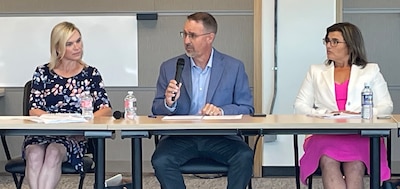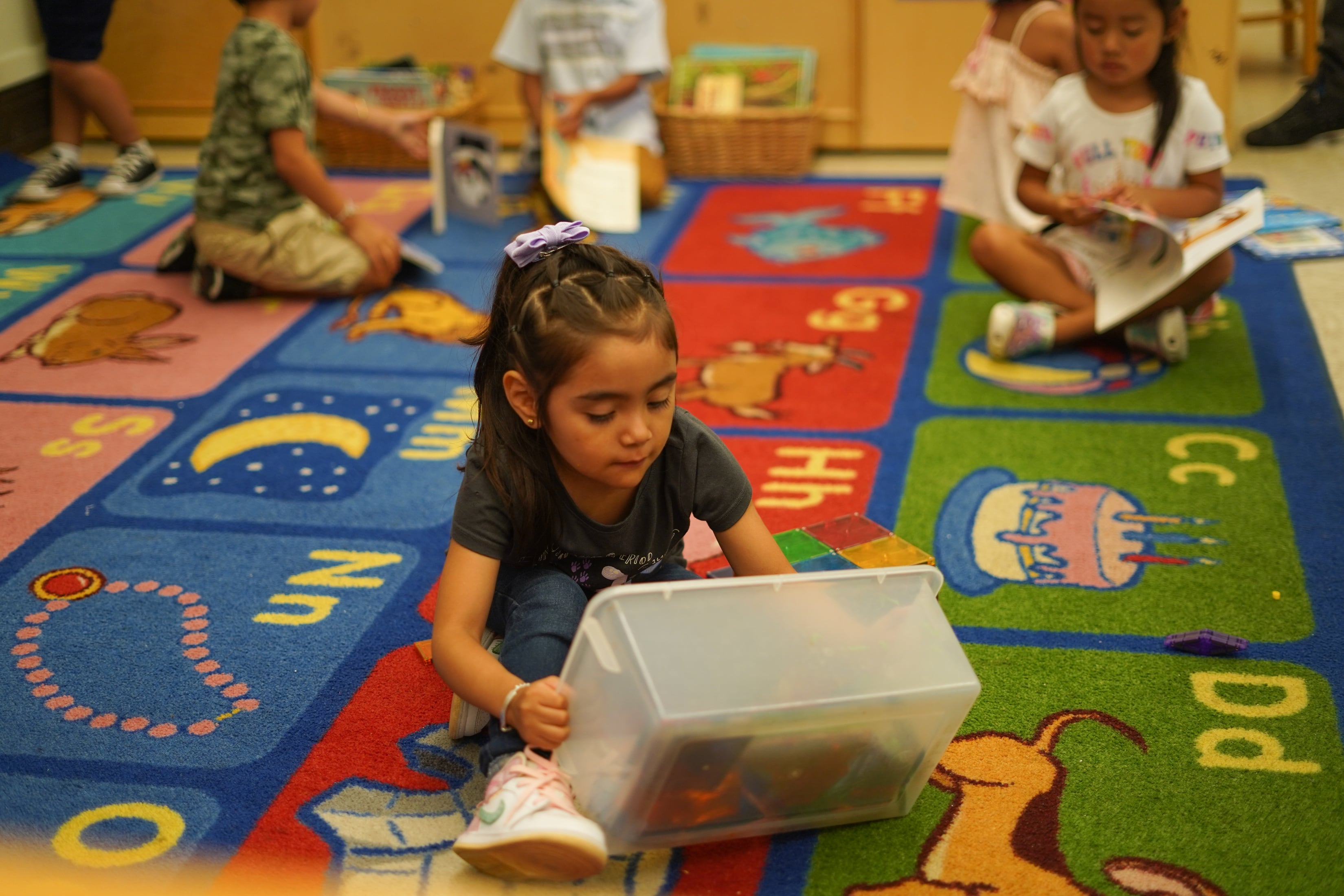Sign up for Chalkbeat Colorado’s free daily newsletter to keep up with education news from Denver and around the state.
Six Colorado school districts and two statewide education groups sued the state Thursday, claiming Colorado’s universal preschool program is harming children with disabilities and breaking financial promises to families and school districts.
The Colorado Association of School Executives, the Consortium of Directors of Special Education, and six districts filed the lawsuit against Gov. Jared Polis, the Colorado Department of Early Childhood, and the Colorado Department of Education in Denver district court on Thursday. The districts include Brighton-based 27J, Cherry Creek, Harrison, Mapleton, Platte Valley, and Westminster.
The groups allege that children will miss out on vital special education services, full-day preschool classes, or any preschool at all because the state’s online matching system is rife with problems. In several of the plaintiff districts, the first day of preschool was this week, but lots of children were missing from class rosters.
The Colorado Department of Early Childhood is running the new preschool program, but the Department of Education is in charge of ensuring that preschoolers with disabilities are served according to special education laws. Launching universal preschool has been one of Polis’ signature priorities since he hit the campaign trail in 2018.
The lawsuit marks the latest and probably most significant bump in the rocky rollout of the preschool program, which offers 10 to 30 hours of tuition-free preschool a week to all 4-year-olds in Colorado and 10 hours to some 3-year-olds. Technology problems, poor communication, and last-minute changes have left many preschool providers and parents confused and frustrated in the run-up to the program’s launch this month.
The lawsuit touches on many of the same issues, with one of the school districts’ most pressing concerns being how the matching system functions — or doesn’t.
Mat Aubuchon, executive director of learning services for the Westminster district north of Denver, described a mother who showed up to preschool Thursday with a three- and a four-year-old — and the school had to turn away the three-year-old because they couldn’t verify the child was correctly placed.
These problems could have been avoided, superintendents said at a press conference, if district administrators had been included years earlier in the preschool planning process.
“I’m saddened that we’re here today,” said Cherry Creek Superintendent Christopher Smith. “All we’re asking is to be part of the solution.”
Thursday’s lawsuit is the third one the state has faced over universal preschool. In June, a Christian preschool in Chaffee County sued the Department of Early Childhood, alleging that a non-discrimination agreement the state requires from universal preschool providers would prevent it from operating in accordance with its religious beliefs. Two Catholic parishes that operate preschools filed a similar lawsuit on Wednesday.
But the school districts’ lawsuit touches more directly on one of universal preschool’s stated purposes: to help children who need it most get a strong foundation for school.
A spokesperson for the Colorado Department of Early Childhood said the department would not comment on pending litigation.
In an emailed statement, Polis spokesman Conor Cahill lamented that the plaintiffs were distracting from the successes of universal preschool and pledged to defend the program “vigorously” in court.
“While it’s unfortunate to see different groups of adults attempting to co-opt preschool for themselves, perhaps because they want to not allow gay parents to send their kids to preschool, or they want to favor school district programs over community-based early childhood centers, the voters were clear on their support for parent choice and a universal, mixed delivery system that is independently run, that doesn’t discriminate against anyone and offers free preschool to every child no matter who their parents are,” Cahill said.
Jeremy Meyer, a spokesman for the Colorado Department of Education, said officials there are still reviewing the complaint.
“It is important to us to emphasize that CDE fundamentally values serving all students, and we are absolutely committed to ensuring preschool students with disabilities receive all the services they are entitled to under federal law to prepare them for success in school,” he said in an email.
A glitchy preschool algorithm creates district headaches
The state’s online preschool matching system — called BridgeCare — is at the center of the latest lawsuit. Starting last winter, preschools listed their offerings on the platform and families used it to apply for a spot. A computer algorithm then matched kids to seats.
But the system doesn’t always work. That’s led to long waits for parents on the state’s helpline, time-consuming manual fixes by regional groups tasked with helping run the new program, and preschool spots that go unfilled despite high local demand, according to the lawsuit.
In addition, district officials’ access to the platform is so limited they sometimes can’t properly place children with disabilities or even contact their families, according to the lawsuit. As a result, public schools can’t fulfill their legal obligation to such students and their parents, the plaintiffs said.
The lawsuit describes a last-minute effort in late July to give districts additional access to BridgeCare. In the Harrison district, it yielded days of fruitless back-and-forth between state and district staff about erroneous or missing sign-ups. Although district officials expected 124 students with disabilities to be matched with their classrooms, zero showed up on the list. State officials suggested the district “do some family outreach,” according to the lawsuit.
“We have failed students and we have failed their families,” Harrison Superintendent Wendy Birhanzel said during the press conference. “They will continue to lose instruction until changes are made.”
Bret Miles, executive director of the Colorado Association of School Executives, said part of the reason for problems with BridgeCare is that the state didn’t spend the money needed to get a system with more capabilities.
“They bought a cheaper version of it,” he said.

Besides the matching system, the lawsuit alleges several instances in which state officials rolled back funding pledges, inappropriately diverted money for students with disabilities to the general education preschool fund, or are delaying payments.
The suit cites a promise by the state to pay for full-day preschool for students from low-income families, or who have one of four other risk factors. State officials announced in late July that only a fraction of those students — those from low-income families who also have a second risk factor — are eligible for tuition-free full-day classes.
The Westminster district north of Denver, where many students come from low-income families, will spend $2 million this year to ensure more than 170 4-year-olds whose families expected full-day classes will get them at no cost, according to the lawsuit. The Harrison district, which also has many students from low-income families, estimated it will have to spend several million dollars to cover full-day preschool for children the state now won’t cover.
The suit also claims the state reappropriated $38 million that was supposed to be used for preschoolers with disabilities into a pot of general education preschool dollars. In addition, it alleges the state plans to hold back some money until next June that districts need this year.
Scott Smith, Cherry Creek’s chief financial and operating officer, said when he and other district leaders raised concerns to state officials more than a year ago that there wouldn’t be enough money to fully fund the new preschool program, “We were continually disregarded.”
“That funding isn’t there and wasn’t there,” he said.
About 39,000 Colorado 4-year-olds have been matched with a preschool through the universal program so far. Most families were able to choose from a variety of preschool settings, including schools, child care centers, or state-licensed homes, but parents of students with disabilities were not. Such students — about 12% of the total — will generally be served in public schools, which have a legal responsibility to provide services spelled out in each child’s federally mandated special education plan.
The new $322 million preschool program is funded with proceeds from a voter-approved nicotine tax and dollars from the state’s previous, smaller preschool program, which was only for students from low-income families or who had other risk factors.
Through last school year, Colorado preschoolers who had diagnosed disabilities were served through the state’s “early childhood special education” program. School district teams placed the vast majority of those children in classrooms where at least half of students were typically developing kids.
This year, under the universal preschool program, integrating students with disabilities and their typical peers is still the goal, but the state’s electronic platform has taken over the role district officials used to play. That’s led to some children being matched to settings that don’t make sense or classrooms that don’t have the right balance of children, requiring convoluted change requests that have often further frustrated parents.
Ann Schimke is a senior reporter at Chalkbeat, covering early childhood issues and early literacy. Contact Ann at aschimke@chalkbeat.org.







